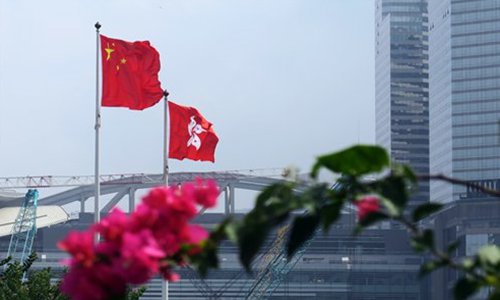HOME >> CHINA,SPECIAL-COVERAGE
Mainland set to defend HK
By Wang Cong in Hong Kong and Chen Qingqing in Beijing Source:Global Times Published: 2019/9/8 23:58:40
Fitch’s downgrade an attempt to undermine SAR economy

Aerial photo taken on May 23, 2018 shows Lok Ma Chau Loop area and its surrounding scenery at the border between Hong Kong and Shenzhen. Photo: Xinhua
If you ask Hong Kong residents who have been working in business since the city returned to China in 1997, they can tell countless stories of how the city and the mainland helped each other over the years.
One story in particular stands out. It's about how the mainland helped the city beat back foreign profiteers in the late 1990s, which marked a moment of clarity of the shared destiny of the city and the motherland.
More than two decades later, as the city grapples with months of political unrest, foreign profiteers appeared to be poised to strike again, with US credit ratings agency Fitch Ratings Inc on Thursday downgrading Hong Kong as a long-term foreign currency debt issuer.
This time profiteers are facing a much more resilient Hong Kong economy and a much more powerful mainland that stands ready to help the Hong Kong Special Administrative Region (HKSAR) defend itself against any aggression, officials and business leaders said.
Foreign aggression
Completely disregarding the HKSAR government's robust efforts in containing the riots from damaging the core values of Hong Kong and in stabilizing the economy, Fitch lowered Hong Kong's AA+ rating to AA, and that hinted at its bearish view on the city's growth.
Fitch's move to focus on speculation about the continued implementation of the "one country, two systems" model that governs Hong Kong drew immediate push-back from officials in Hong Kong.
Paul Chan, Hong Kong Financial Secretary, criticized the move on Friday, calling it "purely speculative and groundless."
"Since Hong Kong's return to the motherland, the Basic Law has provided a strong safeguard to the 'one country, two systems' principle and the continued prosperity [of HKSAR]," he said in a statement sent to the Global Times on Friday, noting that Hong Kong's deep economic and financial ties with the mainland serve as a positive driver for the city's long-term development, not a constraint.

Flags of China and China's Hong Kong Special Administrative Region fly in front of the Legislative Council Complex in Hong Kong. Photo: IC
Fitch's move on Thursday followed constant interference in Hong Kong affairs by foreign officials, particularly those from the US and the UK. Praise of the street violence by US officials including that by Mike Pompeo, US Secretary of State, has also rattled residents.
"The current situation in Hong Kong offered an excuse for Fitch's downgrading, which works in tandem with [the US'] political moves to hit confidence in Hong Kong," Li Xiaobing, an expert on Hong Kong, Macao and Taiwan from Nankai University in Tianjin, told the Global Times on Friday.
Historic lesson
For many Hongkongers, this round of foreign aggression reminds them of the late 1990s, when a financial storm fueled by foreign speculators and led by George Soros was looming in Thailand.
After hitting hard the Thai economy and currency, the storm quickly spread throughout Asia and as a major financial hub, Hong Kong also became next main target.
"International speculators took a 'double manipulation' approach, simultaneously hitting the Hong Kong dollar and the Hong Kong stock market. With the help of the media with ulterior motives, the move led to a confidence crisis in the market about the Hong Kong currency and Hong Kong's financial system," Norman Chan Tak-Lam, chief executive of the Hong Kong Monetary Authority, told the Global Times. "If we let the [activities] continue and sit idle, the Hong Kong dollar and the financial system could crash."
The HKSAR government made an unprecedented move to use the city's reserves to purchase stocks, directly hitting back at the speculators. But the move was a dangerous one because if HKSAR reserves were not sufficient, it would have meant the Hong Kong economy could collapse, said Jonathan Choi Koon-shum, chairman of the Chinese General Chamber of Commerce.
"That's why the involvement of the central government was very important," Choi told the Global Times, adding that the People's Bank of China, the country's central bank, sent advisors to Hong Kong and offered full support for Hong Kong.
Norman Chan also said that the central government made clear that "it will spare no efforts in preserving Hong Kong's prosperity and stability… At that moment, the central government was no doubt a powerful backing."
The decision by Hong Kong to use its foreign reserves was highly contentious and was criticized as a move that is against free market principles and was not sustainable. But the central government's support provided cover for the move.
In the end, the then foreign profiteers were defeated and Hong Kong maintained its status as global financial hub.
Strong resilience
"Currently, the central government will not step in yet, as the Hong Kong economy has a solid foundation," Liang Haiming, an economist at the Hainan University, told the Global Times on Sunday, noting that as soon as violence stops, tourists will return, new public offerings will return and foreign capital will return.
AB InBev, the world's largest brewer, canceled the planned IPO of its Asia Pacific unit in Hong Kong in July. The IPO was considered the largest of 2019.
China's e-commerce giant Alibaba has reportedly delayed its planned second listing in Hong Kong due to the region's protests.
Liang said that although the city has been facing some damage, it is "not life threatening" and the Guangdong-Hong Kong-Macao Greater Bay Area development plan, where Hong Kong is expected to play a prominent role, could help Hong Kong through the hardship.
The central government has also laid out a slew of other efforts to help ensure long-term development in Hong Kong, including its significant role in the recently announced plan to build Shenzhen, South China's Guangdong Province, into a global benchmark city.
Norman Chan also said that Hong Kong's financial and banking systems have built a strong buffer and resilience over the past years. "In recent months, Hong Kong's financial and banking systems, money and stock markets remain stable and operate in an orderly manner."
RELATED ARTICLES:
Posted in: HK/MACAO/TAIWAN,FOCUS NEWS